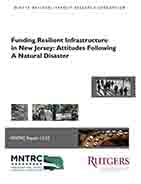Abstract:
Recent major natural disasters in New Jersey have demonstrated the need to increase the resilience of transportation infrastructure. This research examines public attitudes toward revenue sources that can be dedicated to protecting vulnerable areas, most notably the transportation linkages on which the state depends. A statewide survey was conducted to gather data approximately four months following Superstorm Sandy, the costliest natural disaster in the state’s history. The authors’ objective was to sample public attitudes while the impacts of the disaster were still fresh. They found little support for temporary tax increases to improve resiliency, with the most positive support for taxing visitors (i.e., a hotel and recreational tax) and for a 30-year bond measure (i.e., taxing the future). This observation seemingly contradicts broad support for investing in new infrastructure, as well as maintaining and protecting existing infrastructure. Multivariate analysis to understand the underlying attitudes toward raising revenue found that more left-leaning or communitarian attitudes are associated with more support for gasoline, income, or sales taxes devoted to mitigating vulnerability. Those who supported investment in transit and protecting infrastructure also were more likely to support these taxes. There was no parallel finding of factors associated with taxing visitors or issuing bonds.
Publications:
Authors:
ROBERT B. NOLAND, PH.D.
Robert B. Noland, PhD, is a professor at the Edward J. Bloustein School of Planning and Public Policy and is the director of the Alan M. Voorhees Transportation Center. He received his PhD in energy management and environmental policy from the University of Pennsylvania. Prior to joining Rutgers University, he was Reader in Transport and Environmental Policy at Imperial College London and a policy analyst at the US Environmental Protection Agency. He also conducted postdoctoral research in the Economics Department at the University of California, Irvine. The focus of Dr. Noland’s research is the impacts of transport planning and policy on both economic and environmental outcomes. Work on economic effects has included examining behavioral reactions to changes in reliability, associations with the built environment, and trip-chaining behavior. Environmental work includes impacts on safety, climate, health, and other factors associated with overall quality of life. Active research areas include developing methods to evaluate the life cycle greenhouse gas emissions associated with building transport projects; evaluating the economic impacts of transit-oriented development; analysis of walking behavior and links to other travel behavior and the built environment; analysis of traffic and pedestrian safety using spatial analysis techniques; and, assessment of the economic effects of transport investments, in particular those associated with agglomeration externalities. Dr. Noland’s research has been cited throughout the world in debates over transport infrastructure planning and environmental assessment of new infrastructure. Dr. Noland is currently associate editor of Transportation Research-D (Transport and Environment) and the International Journal of Sustainable Transportation, and he is chair of the Transportation Research Board Special Task Force on Climate Change and Energy.
MARC D. WEINER, PH.D.
Marc D. Weiner, PhD, is associate research professor at the Edward J. Bloustein School of Planning and Public Policy at Rutgers University. He collaborates with the Bloustein School’s faculty, students, center directors, and research staff to support data collection and analysis across a number of research domains including social and economic policy, energy policy, environmental protection, public health, transportation policy, education, and urban planning. Substantively, his personal research agenda focuses on risk perception and tolerance in the environmental domain, and on exploring the determinants of technology adoption attitudes and behaviors. Dr. Weiner is the past president, and was the founding president, of the New Jersey-Pennsylvania chapter of the American Association for Public Opinion Research and is on the Executive Council of the Association of Academic Survey Research Organizations. At the graduate level, Dr. Weiner teaches survey research methodology, advanced qualitative methods, and demography and population studies. Weiner received his PhD in American politics, public law, and political methodology from Rutgers University, New Brunswick, in May 2005, and a juris doctor from Widener University in May 1986.
MICHAEL R. GREENBERG, PH.D.
Michael Greenberg, PhD, studies environmental health and risk analysis. He is distinguished professor and associate dean of the faculty of the Edward J. Bloustein School of Planning and Public Policy, Rutgers University. He has written more than 30 books and more than 300 articles. His most recent books are The Environmental Impact Statement After Two Generations: Managing Environmental Power, New York: (Routledge 2011), Nuclear Waste Management, Nuclear Power and Energy Choices: Public Preferences, Perceptions, and Trust, (Springer 2012), and Protecting Seniors Against Environmental Disasters: From Hazards and Vulnerability to Prevention and Resilience (Earthscan 2014). Dr. Greenberg has been a member of National Research Council Committees that focus on the destruction of the US chemical weapons stockpile and nuclear weapons; chemical waste management; and the degradation of the US government physical infrastructure, and sustainability and the US Environmental Protection Agency. Currently, he is chairing a committee for the appropriations committees of the US Senate and House to determine the extent that the US Department of Energy emphasizes human health and safety in its allocations for remediating former nuclear weapons sites. Dr. Greenberg has received awards from the United States Environmental Protection Agency, the Society for Professional Journalists, the Public Health Association, the Association of American Geographers, and the Society for Risk Analysis. He served as area editor for social sciences and then editor-in-chief of Risk Analysis: An International Journal from 2002-2013, and he continues as associate editor for environmental health for the American Journal of Public Health. Greenberg received his PhD in environmental and medical geography, and an MA in urban geography, from Columbia University in 1969.


